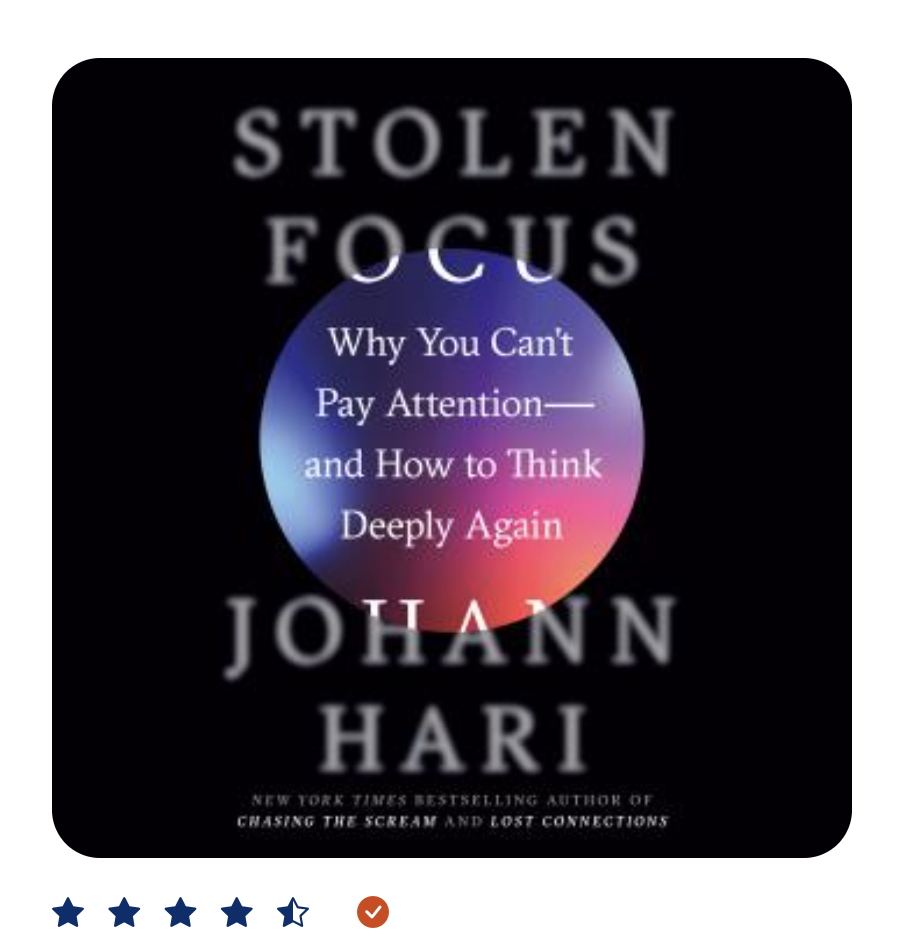Laurie's Blogs.
Sep 2023
Reducing Distraction & Increasing Productivity

I am listening to a very interesting book right now. It’s called “Stolen Focus – Why you can’t pay attention – and how to think deeply again” by Johan Hari. I can’t tell you what drew me to this book, but sometimes you see things when you’re meant to see them! I have a subscription to both Audiobooks and Audible, so I listen to a couple of books a month. I guess this one just caught my attention! Well, I have to say that I am really liking it and learning lots too.
The author tells the story of feeling like he was losing his ability to focus. He originally attributed it to aging. I have to admit that I’ve had the same experience and came to the same determination for my part. Well, it turns out, that’s not so!
The book dives into technology – the internet, emails, & social media. The author took a 3 month break away from his computer and smart phone in order to write a book. (Clearly, not an option for most of us!) Once he survived the withdrawal period, he noted how many more things he thought about and noticed. He came up with ideas. He read books. He read the newspaper. He talked to people. He enjoyed nature.
Okay, so, that all make sense, but that’s not ‘real life’. The solution isn’t stopping all technology and all will be well. What I am liking most about the book, and what I am learning most comes from the science he imparts.
• The average attention span of people has gotten shorter and shorter over the decades. The current attention span of Gen Z is appx 3 minutes!
• Social media algorithms are designed to keep us scrolling.
• Any disruptions to our concentration (i.e. notifications on our phone, computer, iPad, etc.) will disrupt us, so as to impair the next 20 minutes of our time! (Just think about the times you check the device that is making the bing or buzz?)
• Social medial algorithms are designed to make you angry. Because inflammatory content is what tends to keep us engaged and/or makes us ‘click’.
• Many of us use social media / technology as a distraction to delay doing something that we don’t want to do or something that will be difficult.
• Without free space to daydream, we lose out on creativity and complex thinking. We don’t piece together pieces of puzzles that could connect – as such we miss out on potential innovations!
• Reading fiction has decreased to approximately 42% of the population. The author provides research that reading fiction and allowing your brain to piece together parts of the book, equate the book to your own life, and contemplate scenarios. Reading fiction tends to make people more empathetic. As well, children whose parent read to them are more empathetic than those that aren’t read to.
• It is the never-ending distractions, lack of focus, and being steered towards content that makes us angry or outraged that is changing the fabric of society and creating a wedge amongst us! It is training us to look for differences between us as compared to our commonalities.
I’m only touching on the parts of it that I can remember right now… these parts stuck out to me! Where I’m at in the book is where he starts to discuss what to do about it. I’m not too far into that section yet, but realistically, here’s what I plan on doing tomorrow as way of honouring what I’ve learned so far.
1. Remove the notifications from my phone (for YouTube at least… honestly, I just have been too lazy to do so until now. I rarely watch YouTube on my phone)!
2. Spend more time without noise and distraction (i.e. just do stuff without trying to multitask or listen to podcasts, or having a YouTube video play in the background… Okay, except listening to this book!)
3. Spend more time away from the computer, and reduce my tendency and desire to check Facebook, X, Telegram, YouTube, Rumble… (I’m too old to care about Instagram or Snap Chat, and LinkedIn is too dull – phew!) I’m going to try to do better to recognize when I’m being ‘sucked in’ to these distractions!
Then… Maybe then, I will feel like I’m as productive as I used to be!
Let me know your thoughts and/or your productivity strategies! I’ve even created a one question survey to track the feedback! PLEASE tell me what you do to avoid distraction (and hopefully we can help each other out!)
https://www.surveymonkey.com/r/4Leg-Distraction
Until next time… Cheers!
Laurie


